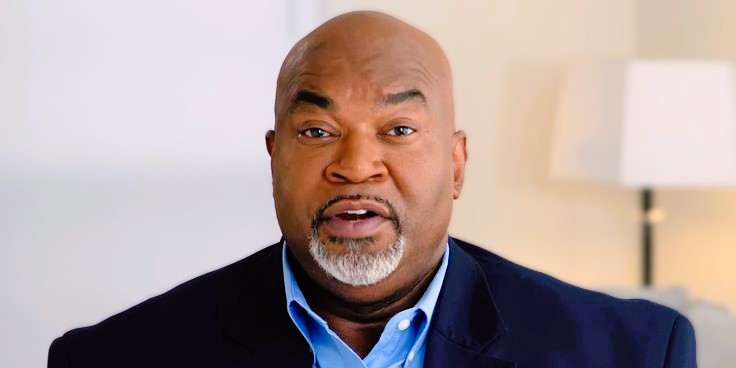
Mark Robinson has emerged as one of the most vocal and recognizable figures in American conservative politics. Currently serving as the Lieutenant Governor of North Carolina, Robinson’s rise from an everyday citizen to one of the most prominent political leaders is nothing short of remarkable. Known for his fiery speeches, unwavering support for conservative values, and staunch defense of the Second Amendment, Robinson has become a symbol of the growing influence of grassroots activism in American politics.
Early Life and Humble Beginnings
Born and raised in Greensboro, North Carolina, Mark Robinson grew up in a working-class family as the ninth of ten children. His upbringing was marked by both hardship and perseverance. Robinson has often shared stories of his difficult childhood, including his family’s struggles with poverty and domestic abuse. These early experiences shaped his worldview, fostering a deep belief in the power of personal responsibility and the importance of family values.
Robinson’s path to political prominence was far from conventional. He did not grow up with aspirations of holding public office. Instead, he spent much of his life working in manufacturing, serving in the U.S. Army Reserves, and dealing with the challenges of everyday life, including bankruptcy and unemployment. His personal experiences have contributed to his appeal as a “man of the people” — someone who understands the struggles of ordinary Americans.
A Viral Moment and Political Ascent
Mark Robinson’s journey into the political arena began in April 2018 when he delivered a passionate speech at a Greensboro City Council meeting. At the time, the council was considering canceling a gun show in the wake of a school shooting. Robinson, an ardent supporter of the Second Amendment, took the podium to voice his discontent, delivering a powerful defense of gun rights.
His speech, in which he declared, “I am the majority,” quickly went viral, garnering millions of views across social media platforms. The video thrust Robinson into the national spotlight, turning him into an overnight sensation among conservative circles. Many saw him as a fresh, unpolished voice who could articulate the frustrations of ordinary citizens who felt ignored by politicians and the media.
This viral moment laid the foundation for Robinson’s political career. In 2020, he ran for Lieutenant Governor of North Carolina, winning the Republican primary and then the general election. His victory made him the first Black Lieutenant Governor in North Carolina’s history, a milestone that he proudly acknowledges, though he often emphasizes that he does not define himself by his race.
Conservative Values and Policy Positions
Mark Robinson’s political platform is firmly rooted in conservative principles. He is a vocal proponent of limited government, individual liberties, and traditional family values. One of his most defining stances is his unwavering support for the Second Amendment. He believes that the right to bear arms is fundamental to American freedom and has consistently opposed any efforts to implement gun control measures.
In addition to his stance on gun rights, Robinson is a strong advocate for pro-life policies. He has been an outspoken critic of abortion, arguing that the rights of the unborn should be protected. His position on this issue aligns with the broader conservative movement, and he often frames it as a moral and ethical imperative.
Education is another area where Mark Robinson has focused his attention. As Lieutenant Governor, he chairs the North Carolina Board of Education, where he has pushed for school choice and the removal of what he calls “leftist indoctrination” from public school curricula. He has been particularly critical of the teaching of Critical Race Theory, which he argues promotes divisiveness and resentment.
Controversies and Criticism
While Robinson has garnered a loyal following among conservatives, he has not been without his share of controversies. His outspoken nature and blunt rhetoric have drawn criticism from political opponents and civil rights organizations. Some have accused him of using divisive language, particularly when discussing LGBTQ+ issues. In 2021, Robinson faced backlash for remarks in which he referred to homosexuality and transgenderism as “filth” during a speech at a church. Though he later clarified that his comments were directed at educational materials and not individuals, the controversy highlighted the polarizing nature of his rhetoric.
Mark Robinson has also been criticized for promoting conspiracy theories and making inflammatory statements on social media. Despite these controversies, he remains unapologetic, often doubling down on his positions and framing himself as a defender of free speech and traditional values in the face of “cancel culture.”
The Future of Mark Robinson
Looking ahead, many political observers believe that Mark Robinson has his eyes set on higher office. There is widespread speculation that he may run for governor of North Carolina in 2024, a move that would further cement his status as a rising star within the Republican Party. His ability to connect with grassroots conservatives and his unapologetic defense of their values have made him a formidable figure in American politics.
Mark Robinson’s story is one of resilience, conviction, and a deep commitment to his beliefs. Whether one agrees with his views or not, there is no denying that he has tapped into a powerful force in American politics. His rise from obscurity to political prominence serves as a reminder that, in today’s political landscape, anyone with passion and determination can make their voice heard.
As Mark Robinson continues to build his political career, his influence on the direction of the conservative movement, both in North Carolina and nationally, will be one to watch.